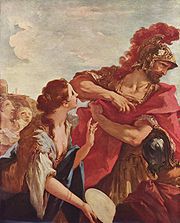|
|||
|
Philatelia.Net / Pirates. Bandits. Adventurers / Plots / The directory «Plots»Jephthah (also spelled Jephtha; from Hebrew יפתח Yiftach)Jephthah is a character in the Hebrew Bible's Book of Judges, serving as a judge over Israel for a period of six years (Judges 12:7). He lived in Gilead and was a member of the Tribe of Manasseh. His father's name was also Gilead. The Israelites "again did what was evil in the eyes of God...they abandoned God and did not worship him. So the anger of the Lord was kindled against Israel, and he sold them into the hand of the Philistines and into the hand of the Ammonites ..." (Judges 10:6-7). Jephthah is driven out by his half-brothers, and takes up his dwelling in Tob, east of Gilead. "There gathered around him some worthless ["empty"] men, and they went out with him." (Judges 11:3) The elders of Gilead ask him to be their leader in the campaign against the Ammonites, but he holds out for a more permanent and a broader position, and the elders agree that provided Jephthah succeeds in defeating Ammon he will be their permanent chieftain. On behalf of Israel as a whole, and in reliance on the might of God the Judge, Jephthah challenges the Ammonites. The spirit of God comes upon Jephthah and he swears an oath: "Whatever/whoever emerges and comes out of the doors of my house to meet me, when I return in peace from the people of Ammon, shall surely be God’s, and I shall sacrifice him/her/it as a holocaust." (Judges 11:31 - a holocaust is a burnt offering). The victorious Jephthah is met on his return by his daughter, his only child. Jephthah tears his clothes and cries, "Alas, my daughter! You have brought me very low!" but is bound by his vow: "I have given my word to God, and I cannot go back on it"(Judges 11:35). The girl asks for two months' grace, "... that I may go down on the mountains ... and bewail my virginity" (Judges 11:37). And so Jephthah "carried out his vow with her which he had vowed" (Judges 11:39). The story ends by recounting how "the daughters of Israel went four days each year to celebrate about the daughter of Jephthah the Gileadite" (Judges 11:40). Later, Jephthah went to war against the Ephraimites, who refused to acknowledge him. The story is remembered for the killing of the fugitive Ephraimites who were identified by their accent; they said the Hebrew word shibboleth as sibboleth. "And there fell at that time of the Ephraimites forty and two thousand." (Judges 12:5-6). Jephthah is mentioned in the New Testament in Hebrews 11:32 as a man of faith. He is commemorated as one of the Holy Forefathers in the Calendar of Saints of the Armenian Apostolic Church on July 30. Advertising: |
|||
© 2003-2024 Dmitry Karasyuk. Idea, preparation, drawing up
|

